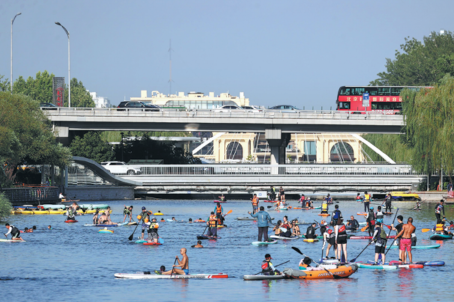Travel booms during May Day holiday


Hong Kong and Macao also were among the most popular destinations for Chinese mainland tourists. Tuniu Corp, a Nanjing-based online travel agency, designed a five-day tailored trip to the two cities, and the package became the best-selling option among outbound destinations on the platform.
On the first day of the holiday, more than 165,000 Chinese mainland travelers visited Hong Kong, according to the special administrative region's Immigration Department. On the same day, some 100,000 Chinese mainland tourists visited Macao, according to the local government.
China has resumed outbound group tours to 60 countries and regions, most of which have canceled the requirement to provide negative nucleic acid test results, according to the Ministry of Culture and Tourism. The country halted outbound group travel early in 2020 due to the pandemic.
Encouraged by the changes, Chinese travelers have shown an increasing interest in taking tours to more distant destinations. As of mid-April, Trip.com had nearly sold out its group tours to Europe, the Middle East and Africa. Popular destinations included the United Arab Emirates, Spain, Portugal, Switzerland, Greece and Egypt, the company said.
In domestic travel, the hotel booking volumes for some most popular destinations nearly doubled pre-pandemic levels, and many travelers booked higher-end hotels. Cities that saw the highest volumes of hotel bookings included Beijing; Shanghai; Chongqing; Chengdu, Sichuan province; Guangzhou, Guangdong province; and Changsha, Hunan province, according to Qunar.
"During the May Day holiday, a large number of Chinese travelers took trips for the first time in three years, and many were looking for better vacation experiences, including stays at luxury hotels," said Guo of Qunar.
"Some smaller hotels closed due to the challenges brought by the pandemic. Chain hotels have occupied a larger market share, and some of them have lowered room prices," Guo said.
A number of smaller Chinese cities were also popular with domestic travelers. Among them were Zibo, Shandong province; Dehong, Yunnan province; and the Ili Kazak autonomous prefecture in the Xinjiang Uygur autonomous region, which saw hotel bookings surge more than 10-fold compared with the same period in 2019, Qunar said.
The travel frenzy also drove up consumer buying levels in those cities, the agency said.
Zibo's barbecue, which has become a viral topic on social media platforms, attracted many travelers to the city during the holiday. A traveler visiting Zibo might spend about 50 yuan per person to have a barbecue, but that would drive total spending of some 750 yuan for transportation and accommodations, according to a projection by Qunar's research institute.
After three years of the pandemic, boosting consumer spending has become a priority for domestic cities. Many other cities also hoped to leverage their economic growth with featured local products just like Zibo.
"Zibo barbecue has created a national sensation. It was not only due to the delicacy itself, but also thanks to joint efforts of the local government, retailers and merchants who operated with integrity, and hospitable local residents," Guo said.




































